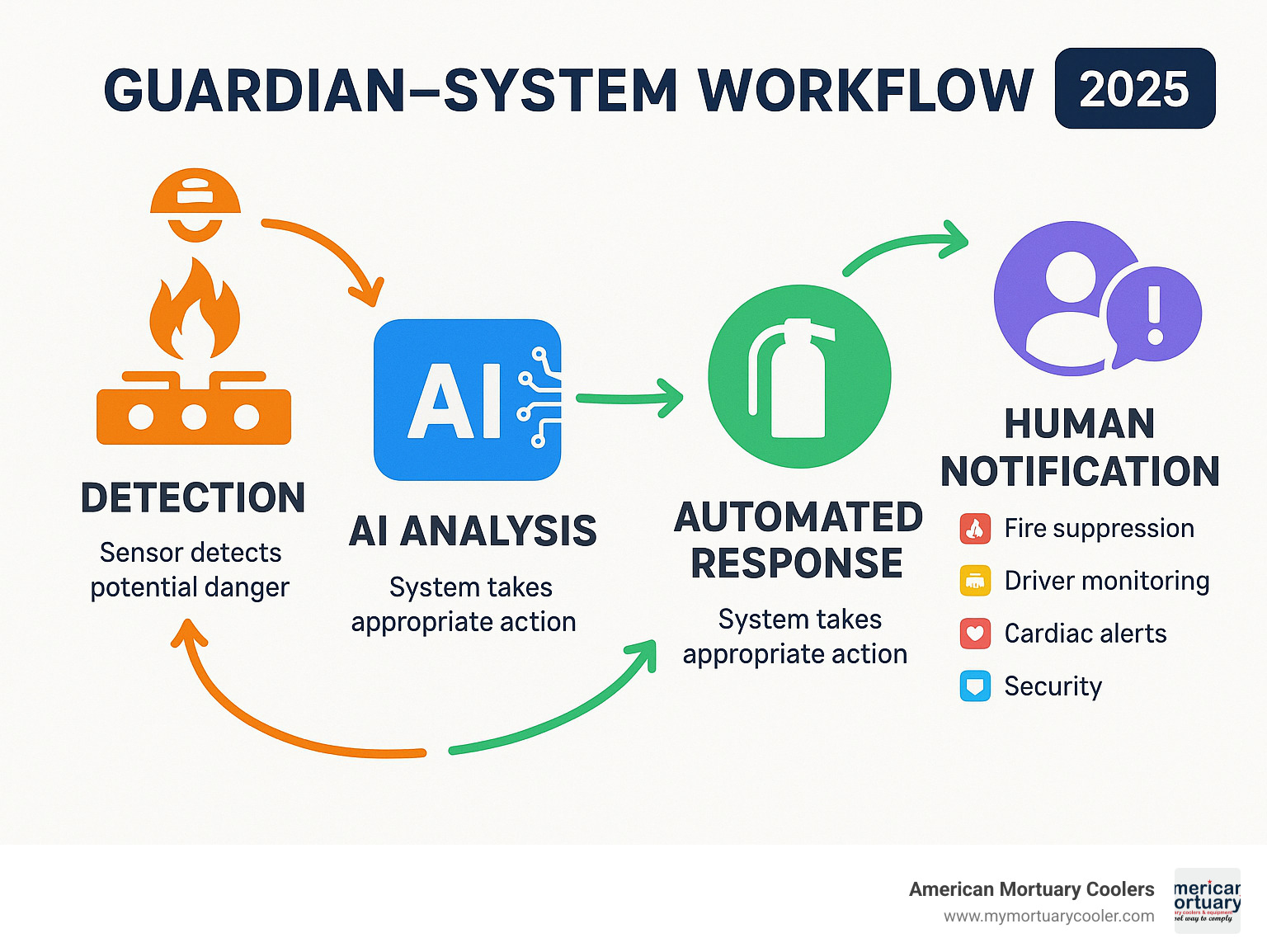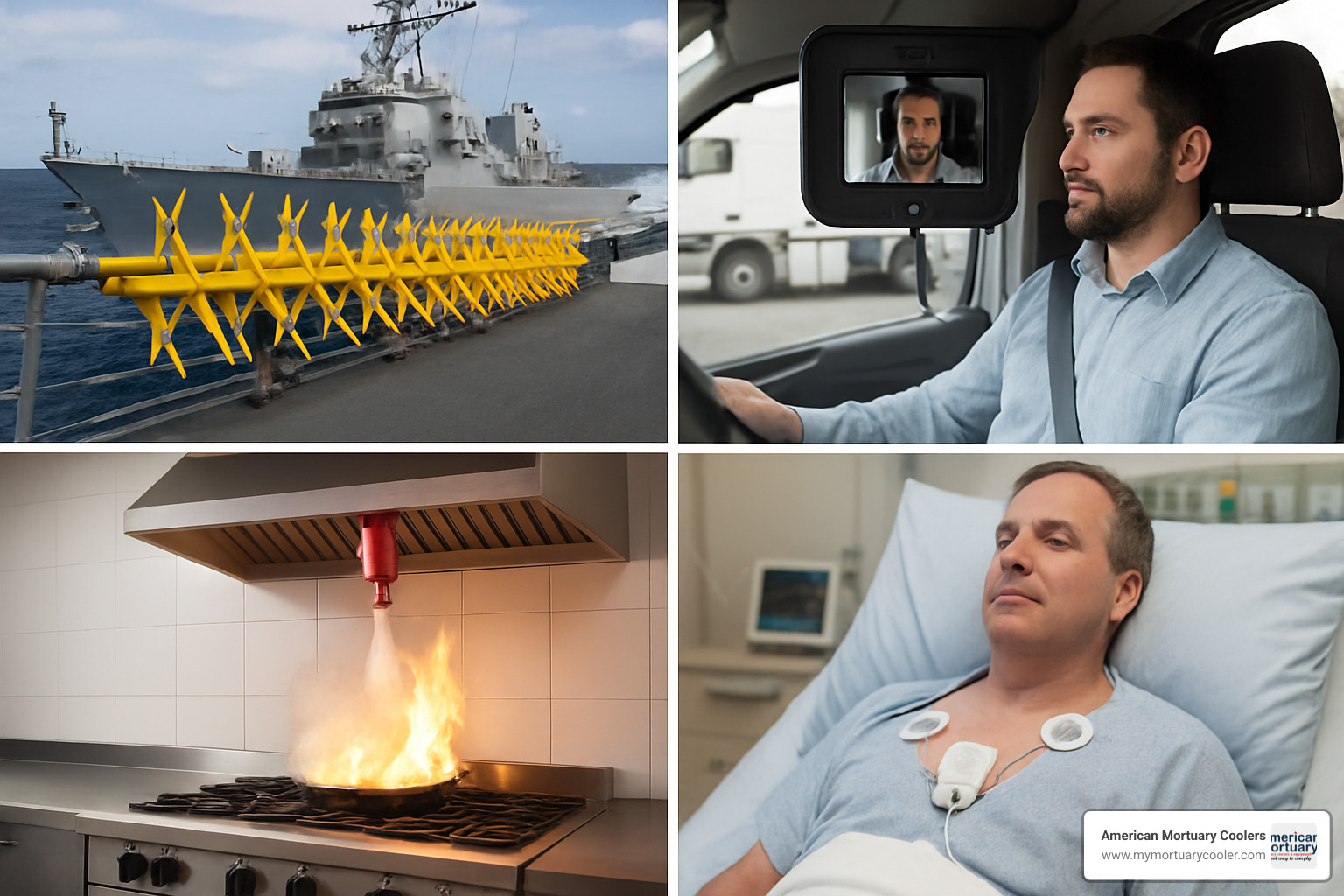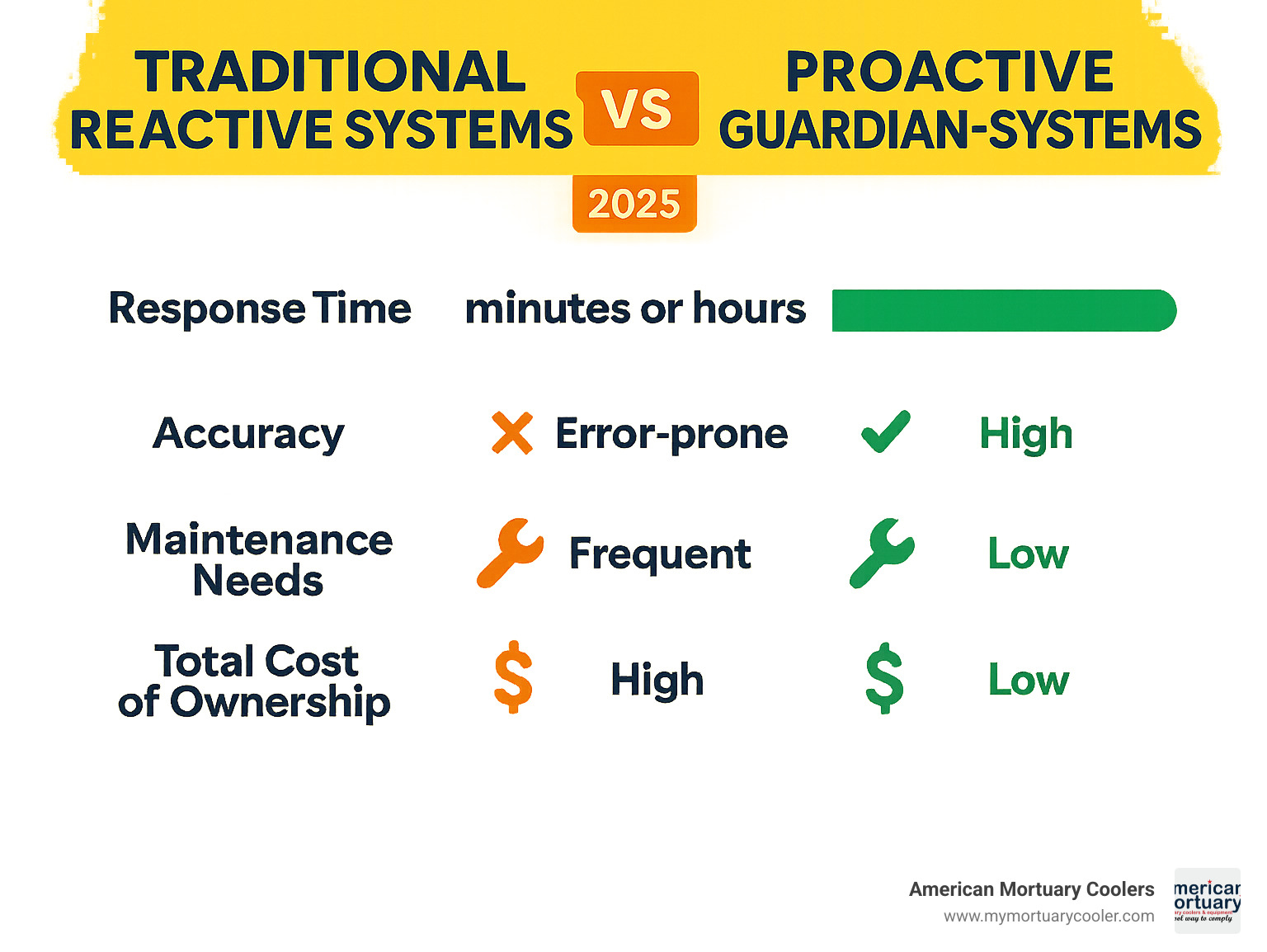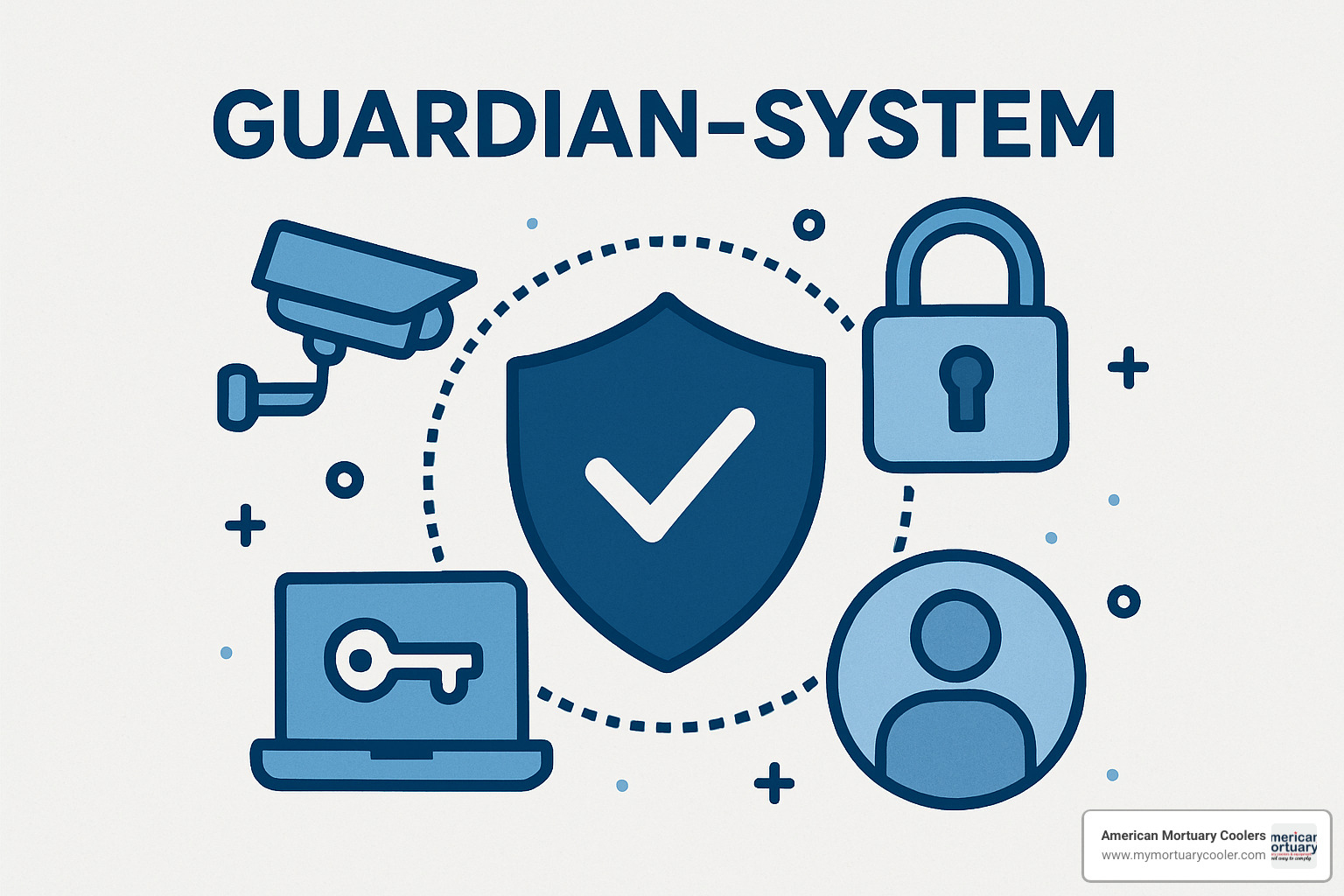
The Definitive Guide to the Guardian-System
Why Guardian-Systems Are Revolutionizing Safety and Security
A guardian-system represents the next generation of intelligent monitoring and protection technology that actively watches, analyzes, and responds to threats across multiple industries. Unlike traditional reactive security measures, these systems combine AI-powered sensors, real-time analytics, and automated response protocols to prevent incidents before they escalate.
Key Guardian-System Applications:
- Fire Suppression - Automatic stove-top protection with 400,000+ installations worldwide
- Driver Safety - Fatigue and distraction monitoring protecting 800+ transport organizations
- Cardiac Monitoring - FDA-approved implantable systems detecting silent heart attacks
- Maritime Security - Anti-piracy barriers protecting 426 ships with zero attacks since 2016
- Counter-Drone - 250+ GUARDION components defending critical infrastructure globally
- Corrections Management - RFID platforms supporting 75,000+ officers nationwide
The research shows guardian-systems deliver measurable results: patients reach emergency rooms 6.3 hours faster with cardiac monitoring, 83% of campus cooking fires are preventable with proper suppression systems, and no ships with maritime barriers have experienced pirate attacks since November 2016.
These systems excel by fusing multiple data sources - from facial recognition cameras detecting driver fatigue to thermal sensors monitoring stove temperatures to RFID tags tracking inmate movements. The integration of artificial intelligence allows guardian-systems to learn normal patterns and immediately flag anomalies that human operators might miss.

What Is a Guardian-System and Why It's Changing Safety
A guardian-system is an intelligent monitoring platform that works around the clock, watching for potential threats, analyzing what they see in real-time, and jumping into action before problems spiral out of control.
While typical alarm systems wait until something bad happens and then alert you, a guardian-system prevents that bad thing from happening in the first place. It's the difference between a smoke detector that beeps when your house is already on fire versus a system that notices your stove getting too hot and turns it off automatically.
The Evolution of the Guardian-System
The story of guardian-systems starts in the military, where keeping watch for threats was survival. Early systems were basic sensor networks that could detect movement or environmental changes.
Everything changed during the digital revolution of the 2000s. High-speed internet meant sensors could communicate instantly. Cloud computing provided massive data processing power. Mobile phones put control in our pockets. And sensors became sophisticated enough to detect everything from drowsiness to air chemistry changes.
The real game-changer has been AI adoption. Modern machine learning can process billions of data points and spot patterns that would take humans years to notice. This lets guardian-systems predict problems before they happen and respond with incredible precision.
Key Applications at a Glance
Guardian-systems have found their way into every industry where safety matters, with proven results.
In fire suppression, Guardian Safety Solutions has installed over 400,000 systems worldwide. Their Guardian system is the only one with UL/ULC certification for protecting home stove-tops, crucial since 83% of campus fires start in the kitchen.
For driver fatigue monitoring, Guardian by Seeing Machines protects 800+ commercial transport companies using face and eye-tracking technology to spot tired or distracted drivers in real-time.
The counter-UAS world relies on GUARDION systems, with over 250 components deployed globally, protecting against unauthorized drones through detection, reaction, and neutralization.
In cardiac monitoring, the Avertix Guardian broke new ground as the world's first FDA-approved implantable heart attack warning system. Patients with these devices reach emergency rooms an average of 6.3 hours faster than those relying on symptoms alone.
Maritime anti-piracy operations use Guardian Maritime systems to protect ships at sea. With 426 ships and 8,520 crew members under protection, there hasn't been a single pirate attack on a protected vessel since November 2016.
Types of Guardian-Systems Across Industries

What makes guardian-systems remarkable is how they adapt to solve completely different problems across industries. The same core technology that keeps drivers alert on highways also protects ships from pirates and warns patients about heart attacks.
Security Guardian-System Overview
Security guardian-systems have moved far beyond simple burglar alarms. Today's systems think, learn, and respond like having a security expert watching your facility 24/7.
Intrusion detection combines motion sensors with cameras that recognize faces and analyze behavior patterns. The AI learns normal activity patterns, reducing false alarms while improving threat detection.
Fleet fatigue monitoring through Guardian systems has revolutionized transportation safety. These systems watch drivers' faces continuously, tracking eye movements and head position to detect drowsiness or distraction, using vibration, sound, and visual warnings for immediate alerts.
Counter-UAS protection through the GUARDION system represents cutting-edge drone defense. With over 250 components deployed worldwide, this system detects, identifies, and neutralizes unauthorized drones while minimizing false alarms.
Safety & Fire Guardian-System Overview
Fire protection guardian-systems have transformed fire safety, especially where traditional sprinkler systems aren't suitable.
Stove-top suppression systems from Guardian Safety Solutions are the only UL/ULC listed systems for domestic stove-top protection in commercial settings. With over 400,000 installations worldwide, they automatically detect fires, extinguish them, and shut off power to prevent reignition.
Senior living protection addresses the reality that adults over 50 face the highest risk of death from cooking-related fires. Guardian systems provide automatic protection that works even when residents might be confused or unable to respond quickly.
Medical Guardian-System Overview
Medical guardian-systems operate where the difference between life and death can be measured in minutes.
Implantable cardiac alerts through the Avertix Guardian represent a breakthrough in heart care. This FDA-approved heart attack warning system continuously monitors your heart's electrical signals.
Silent infarction detection solves a frightening problem - up to 45% of heart attacks happen without chest pain, especially in women, elderly patients, and diabetics. Research published in the Journal of the American College of Cardiology shows Guardian users reach emergency rooms an average of 6.3 hours earlier than those relying on symptoms alone.
Industrial & Maritime Guardian-System Overview
Industrial guardian-systems focus on keeping operations running smoothly while protecting workers and preventing equipment failures.
Foundry ERP and MES systems from Guardian Software bring over 30 years of specialized experience to manufacturing environments, providing real-time visibility into facility operations.
Maritime anti-piracy operations through Guardian Maritime have achieved zero successful pirate attacks on protected vessels since November 2016. Their patented physical barrier system protects 426 ships and 8,520 crew members worldwide, providing cost-effective protection at as little as £3.13 per day for large vessels.
Core Technologies and Features Powering Modern Guardian-Systems
A guardian-system combines several cutting-edge technologies that work together like a well-coordinated team.
AI algorithms serve as the brain, processing enormous amounts of information faster than any human could. These smart programs learn and improve over time - when a cardiac monitoring system sees thousands of heartbeats, it becomes incredibly good at spotting subtle patterns that signal trouble.
Computer vision gives guardian-systems the ability to truly "see" what's happening. This isn't just recording video - it's understanding what the video means. A driver monitoring system can distinguish between someone checking mirrors and someone nodding off at the wheel.
IoT sensors act like an incredibly sensitive nervous system, constantly measuring temperature, detecting motion, monitoring heart rhythms, and tracking facial expressions. The more sensors working together, the clearer picture the system gets.
Cloud analytics provide the heavy lifting for processing data from hundreds of sensors across multiple locations, while edge processing ensures critical decisions happen immediately without waiting for distant server responses.
How AI Boosts the Guardian-System
Artificial intelligence transforms a guardian-system from a fancy alarm into something that genuinely understands what it's protecting.
Face-tracking technology in driver monitoring has become remarkably sophisticated, watching for micro-sleeps lasting just seconds, tracking blink frequency, and noticing when eyes drift from the road.
Anomaly detection is where AI excels. The system learns what "normal" looks like in incredible detail, then immediately spots anything unusual. Scientific research on continuous monitoring has proven how effective this approach can be in saving lives.
Predictive analytics analyzes patterns in historical data alongside current conditions to predict problems before they happen.
Hardware & Connectivity Essentials
Rugged sensors are built to handle harsh environments - maritime systems deal with salt spray, kitchen systems work in heat and grease, industrial systems operate in dusty, vibrating conditions.
Cellular gateways provide communication backbone, with smart systems using multiple carriers and switching between connection types for reliable communication. Satellite communications serve locations where cellular coverage is limited.
Fail-safe battery systems ensure guardian-systems keep working during power outages, with sophisticated power management that can maintain critical functions for hours or days.
Data Privacy, Security & Compliance
GDPR compliance affects any guardian-system processing personal data of European residents. HIPAA requirements apply to medical systems. UL and NFPA standards govern fire suppression systems. Class 1 Division 1 certification is required for systems in explosive industrial environments.
Implementation, Integration & Lifecycle Management

Getting a guardian-system up and running requires careful planning, smart integration, and ongoing attention to maintain peak performance.
Traditional systems might take several minutes to detect problems and longer to respond. A guardian-system can spot trouble and respond in seconds. Accuracy is another game-changer - AI dramatically cuts false positives while improving real threat detection.
Maintenance differs significantly too. Traditional systems need regular physical checks and scheduled downtime. Guardian-systems are smart enough to self-diagnose and many problems can be fixed remotely.
Installing a Guardian-System Step-by-Step
The site audit comes first - technicians map your facility, identify trouble spots, and determine how the new system integrates with existing infrastructure.
Hardware placement requires positioning sensors where they can work effectively without damage or false alarms. Software configuration involves setting alert thresholds, defining response protocols, and creating user accounts.
User onboarding is critical for system success - even sophisticated systems won't help if people don't know how to use them properly.
Maintaining Peak Performance
Many guardian-system providers operate 24/7 monitoring centers with trained analysts who respond to alerts immediately. Firmware updates keep systems current with latest features and security patches. Sensor calibration ensures accuracy over time.
Regulatory Certifications & Standards to Know
UL and ULC listings are essential for fire suppression systems. FDA approval is required for medical devices. ISO 9001 certification ensures consistent quality management. NFPA 70 compliance governs electrical systems in hazardous environments.
Guardian-Systems in Action: Proof Through Case Studies

Real results speak louder than marketing claims. These documented cases show where guardian-systems made the difference between tragedy and safety.
High-Risk Environments
Corrections facilities represent some of the most challenging environments for safety technology. GUARDIAN RFID has successfully transformed operations for over 75,000 corrections officers across the United States.
The system's Officer Experience Platform handles security checks, cell inspections, inmate movement tracking, and medication distribution. The Spartan 3 device features 14-hour battery life and Corning Gorilla Glass display - built for harsh prison environments.
Counter-drone protection through the GUARDION system has proven itself in high-stakes situations like the 2015 G7 Summit in Elmau and 2016 U.S. Presidential visit to Hannover. With over 250 components deployed worldwide, the system has successfully defended against threats ranging from hobbyists to potential terrorist attacks.
Life-Saving Moments
The Avertix Guardian cardiac monitoring system creates invisible miracles by detecting heart attacks before symptoms appear. Clinical studies show Guardian users reach emergency rooms an average of 6.3 hours earlier than those relying on symptoms alone.
The statistics are sobering: up to 45% of heart attacks are "silent" without typical symptoms, especially common in women, elderly patients, and diabetics. With approximately 200,000 annual heart attacks in patients who've already had one, the Guardian system addresses a massive unmet need.
Fire suppression systems have achieved zero reignitions after suppression across 400,000+ installations worldwide. Guardian systems don't just put out fires - they automatically shut off power to the stove to prevent reignition, proving especially valuable in senior living facilities.
Asset & Facility Protection
Guardian Maritime has achieved a perfect record: zero successful pirate attacks on protected vessels since November 2016. This represents 8,520 crew members who've gone home safely instead of becoming hostages. The system has successfully defended against five attacks in the Gulf of Guinea and one in the Malacca Straits.
At just £3.13 pence per day for a 60-meter installation, Guardian Maritime provides protection costing less than a cup of coffee while defending assets worth millions.
Driver safety through Guardian by Seeing Machines has protected over 800 commercial transport organizations globally with a remarkable safety record: no fitted truck has experienced a fatigue or distraction rollover incident.
At American Mortuary Coolers, we've seen how guardian-system principles apply to sensitive environments requiring absolute reliability. Enhancing Efficiency and Dignity in the Mortuary Process shows how proper monitoring maintains critical conditions while respecting dignity.
Choosing the Right Guardian-System for Your Needs
Picking the perfect guardian-system requires careful planning and honest assessment to avoid inadequate protection, blown budgets, or systems that create more problems than they solve.
Start with thorough risk assessment of what you're protecting. A hospital faces different threats than a shipping vessel or college dormitory kitchen. Your guardian-system needs to match your specific reality.
Think about both likelihood and potential impact of different scenarios. A pirate attack might seem unlikely, but a single incident can cost millions in ransom, lost cargo, and operational disruption.
Calculate return on investment carefully, including hidden costs like installation, training, maintenance, and monitoring services. Compare this against potential losses without protection.
Scalability matters - your needs will change over time. Choose systems that can grow with new facilities, expanded operations, and changing regulations rather than forcing complete overhauls.
Vendor vetting is critical - look for companies with solid track records in your specific industry, proper certifications, and satisfied existing customers.
Guardian-System Buyer's Checklist
Needs analysis forms the foundation - what specific threats concern you? How much area needs coverage? Do you need 24/7 monitoring or internal alert handling? What existing systems need integration?
Certification matching can make or break projects. Fire suppression needs UL listings, medical devices require FDA approval, industrial applications might need ISO certifications.
Support model evaluation separates professionals from amateurs. What training do they provide? Can you reach support at 2 AM? How quickly do they respond to issues?
Total cost analysis requires looking beyond sticker price - factor in hardware, software, installation, training, monitoring fees, maintenance contracts, and future upgrades.
Future Trends That Will Shape the Guardian-System Market
Edge AI processing means faster responses and better reliability. 5G and 6G connectivity will enable new mobile applications. Digital twins will let systems test scenarios before implementing responses. Autonomous response capabilities are moving beyond alerts to taking actual action.
Sustainability considerations are driving more energy-efficient systems with longer lifespans and reduced environmental impact.
Frequently Asked Questions about Guardian-Systems
How does a guardian-system differ from traditional alarms?
The difference is like comparing a smoke detector to a fire department. Traditional alarm systems are reactive - they only tell you something bad has already happened. A guardian-system is proactive - it's constantly watching, learning, and often fixing problems before you know they exist.
A regular fire alarm screams after smoke fills the room. A Guardian fire suppression system notices the stove getting too hot, automatically puts out flames, and shuts off power - all before you smell smoke.
What ongoing costs should I expect after installation?
Monitoring services are typically your biggest ongoing expense, ranging from $50 to $500 monthly depending on system complexity and criticality.
Maintenance costs include sensor calibration, battery replacements, and system updates. Software licensing covers AI algorithms and updates. Communication fees cover cellular or satellite connectivity.
As a general rule, expect total ongoing costs to run about 10-20% of your initial system cost per year.
Can multiple guardian-systems be unified under one dashboard?
Absolutely - most organizations want everything in one place for a complete picture. Integration is a priority for most manufacturers who understand you might have fire suppression, security monitoring, and fleet vehicle systems.
A unified dashboard lets you monitor everything from one location. However, integration capabilities vary significantly between vendors. When shopping, specify integration requirements upfront and ask for demonstrations of how different systems work together.
Conclusion
The guardian-system revolution isn't just about technology - it's about fundamentally changing how we think about protection. Instead of waiting for disasters and scrambling to respond, these intelligent systems watch, learn, and act before disasters strike.
The numbers tell an incredible story. Over 400,000 fire suppression systems stand guard worldwide. Not a single pirate attack has succeeded against ships with maritime barriers since 2016. Heart attack patients with cardiac monitoring reach hospitals 6.3 hours faster. More than 800 transport companies trust these systems for driver safety.
Behind every statistic is a human story - a family whose home didn't burn down, a crew that made it safely to port, a grandfather who survived a silent heart attack, a driver who made it home safely.
What makes guardian-systems effective is their ability to connect the dots. They don't just watch one thing - they watch everything. Thermal sensors talk to power shutoff systems. Facial recognition triggers immediate alerts. Cardiac monitors send instant notifications to emergency services.
The technology keeps getting smarter. Edge computing means faster responses. 5G networks enable real-time coordination. Digital twins let systems practice responses before emergencies happen. We're heading toward a future where guardian-systems don't just alert us to problems - they solve them automatically.
At American Mortuary Coolers, we've spent years working with facilities that can't afford to fail. Our experience with mortuary refrigeration has taught us that the best protection systems are reliable, monitor continuously, and have backup plans for their backup plans - exactly the principles that make guardian-systems effective across every industry.
The Importance of Mortuary Refrigeration in the United States shows how proper monitoring and environmental control maintain both safety and dignity in sensitive environments - principles that apply whether you're protecting a mortuary, maritime vessel, or manufacturing facility.
The choice isn't whether to invest in guardian-systems - it's whether you can afford not to. When threats are getting more complex and failure costs keep rising, these intelligent protection platforms aren't just nice to have. They're essential.
The peace of mind alone is worth the investment. Knowing that sophisticated AI is watching over your people, assets, and operations 24/7 lets you focus on what you do best instead of worrying about what might go wrong.



